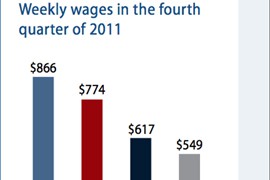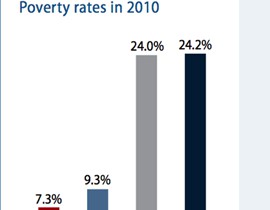Cronkite News has moved to a new home at cronkitenews.azpbs.org. Use this site to search archives from 2011 to May 2015. You can search the new site for current stories.
As economy recovers, minorities continue to lag in workforce
WASHINGTON – Minorities continue to lag behind whites across several economic indicators, even as the job market improves, a report released Thursday says.
The report found that Latinos fared slightly better than blacks in many categories, but advocates said Latinos are still being “walloped” by the economy, as many who re-enter the workforce are doing so by way of unskilled, low-wage jobs.
The findings in the report by the Center for American Progress sparked calls for policies to address minority struggles in the economy.
“We believe financial policy can play a critical role in shaping financial security,” said Cy Richardson, vice president of housing and community development at the National Urban League, during the release of the report. “These policies have been unevenly applied and inconsistently championed.”
The report, which drew on Census numbers and other data, said that minority groups have higher unemployment, earn lower wages, have less health care coverage and run a greater risk of losing their homes to foreclosure than whites. It urges Congress to consider policies that work to educate and train these growing minority communities.
“Latinos feel like they’ve been walloped,” said Catherine Singley, an economic policy analyst with the National Council of La Raza, a Latino advocacy group.
While it’s good to see the Latino community making some gains during the recovery, Singley said it is coming at too slow a pace. Worse, many Latinos are only finding unskilled work for jobs that soon won’t exist, she said.
“The kind of jobs, the quality of jobs that Latinos are getting is worrisome,” she said. “We are seeing people go back into low-wage sectors where they’re unprotected and vulnerable.”
Tom Rex, an economics researcher at Arizona State University’s W.P. Carey School of Business, said trends in Arizona largely mirror the report’s national findings with one exception: He believes the state’s black population is more educated than the national average and is likely faring slightly better.
Rex said it is not surprising that the report found a growing disparity in household wealth between Latino and white families from 2007 to 2009, in part because the Latino community is so young.
“We are seeing widening income disparity in this country regardless of ethnicity, and that’s been going on for three decades now,” Rex said. “If you’re a minority at the lower end of the economic spectrum, you’re definitely losing ground to the affluent.”
Rex said policy changes, such as the DREAM Act, could help minorities attain greater economic success, but he cautioned that government can only do so much to control market forces.








